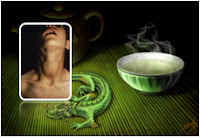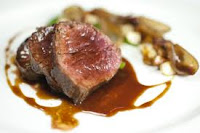Green Tea & Your Thyroid: Are the T4 & T3 Reducing Effects of 250mg (HED) Green Tea Catechins Reason For Concern?
 |
| Is there a devilish thyroid hormone eating dragon hiding out in your beloved green tea? |
"You must be kiddin' green tea helps weight loss, so how can it reduce thyroid function?"
It may sound hilarious that something that is touted as a fat burner and weight loss adjuvant with tons of scientific backup is supposed to have the nasty ability of inducing (probably transient) hypothyrodism. The data Amar K. Chandra and Neela De, University of Calcutta and the University College of Science & Technology present in their most recent paper is yet unambigous: The hailed green tea catechin and flavonoids possess "potent antithyroid activity as evidenced from in vivo and in vitro studies" (Chandra. 2013)
 |
| The 20% reduction in testosterone in response to 5 cups/day of green tea (HED) researchers observed in a 2011 rodent study shows that the thyroid is not the only organ that does not like green tea catechins (learn more), |
Moroever, their data supports the general notion that the hailed green tea flavon-3-ols (flavenols) can mess with all sort of enzymatic conversion processes in the mammalian body - including the aromatization of testosterone to estrogen (Sato. 2002).
It's not just the inhibition of iodine uptake that's the problem here. It's its release and conversion.
By acting directly on the enzymatic activities of thyroid peroxidase and 5'-deiodinase I it effectively blocks the generation of T4, by inhibiting the release of iodine (thyroid peroxidase) and subsequent conversion of the latter to thyroxine (T4), the major thyroid hormone in the mammalian body and precursor to the "metabolically active" triiodothyronine (T3).
"[h]istological examinations of the thyroid gland revealed marked hypertrophy and/or hyper-plasia of the thyroid follicles with depleted colloid content." (Chandra. 2013)What we do yet have to keep in mind is that rodents are in general more sensitive to goitrogenic agents (Döhler. 1979; Capen. 1995) so that the conclusion that dosages as low as 3-4mg/kg of a highly concentrated green tea extract could lead to fulminant reductions in thyroid function or even full blown goitre, is clearly unwarranted.
 |
| "Nutritional thyroid medication" - Sirloin of beef in smoked butter. Those plus tons of veggies and a controlled amount of fruits were the "magical" cure to low thyroid function in kids in a 2012 study shows, you may remember from the SuppVersity news (refresh your memory) |
Bottom line: I am no friend of the notion that the consumption of large amounts isolated extracts of whatever purported health-elixir will have nothing but benefits. The current evidence is yet far from being conclusive enough to give up on your one, two or three cups of green tea per day.
 |
| Though color may matter in terms of the thyroid effects, the most important thing for anyone trying to keep his waist tight appears to be that he/she drinks tea, whether it is green, black, white or well... pu-erh (learn more ;-) |
References:
- Capen CC. Toxic response of the endocrine system. In: Klaassen CD, Amudr MO, Doull J (eds) Casarett and Doull’s toxicology: the basic science of poisons. Barnes and Noble, McGraw-Hill, New York, 1995:617–640.
- Chandra AK, De N. Goitrogenic/antithyroidal potential of green tea extract in relation to catechin in rats. Food Chem Toxicol. 2010 Aug-Sep;48(8-9):2304-11.
- Chandra AK, De N, Choudhury SR. Effect of different doses of un-fractionated green and black tea extracts on thyroid physiology. Hum Exp Toxicol. 2011 Aug;30(8):884-96.
- Chandra AK, De N. Catechin induced modulation in the activities of thyroid hormone synthesizing enzymes leading to hypothyroidism. Mol Cell Biochem. 2013 Feb;374(1-2):37-48.
- Crespy V, Williamson G. A review of the health effects of green tea catechins in in vivo animal models. J Nutr. 2004 Dec;134(12 Suppl):3431S-3440S.
- Döhler KD, Wong CC, von zur Mühlen A. The rat as model for the study of drug effects on thyroid function: consideration of methodological problems. Pharmacol Ther. 1979; 5:305–318.
- Gardner EJ, Ruxton CH, Leeds AR. Black tea--helpful or harmful? A review of the evidence. Eur J Clin Nutr. 2007 Jan;61(1):3-18.
- Gupta S, Saha B, Giri AK. Comparative antimutagenic and anticlastogenic effects of green tea and black tea: a review. Mutat Res. 2002 Sep;512(1):37-65.
- Leung LK, Su Y, Chen R, Zhang Z, Huang Y, Chen ZY. Theaflavins in black tea and catechins in green tea are equally effective antioxidants. J Nutr. 2001 Sep;131(9):2248-51.
- Moon MK, Hong ES, Lim JA, Cho SW, Lim S, Choi SH, Yi KH, Park DJ, Park YJ, Jang HC. Associations between thyroid hormone levels and regional fat accumulation in euthyroid men. Eur J Endocrinol. 2013 Mar 19.
- Sakamoto Y, Mikuriya H, Tayama K, Takahashi H, Nagasawa A, Yano N, Yuzawa K, Ogata A, Aoki N. Goitrogenic effects of green tea extract catechins by dietary administration in rats. Arch Toxicol. 2001 Dec;75(10):591-6.
- Satoh K, Sakamoto Y, Ogata A, Nagai F, Mikuriya H, Numazawa M, Yamada K, Aoki N. Inhibition of aromatase activity by green tea extract catechins and their endocrinological effects of oral administration in rats. Food Chem Toxicol. 2002 Jul;40(7):925-33.



